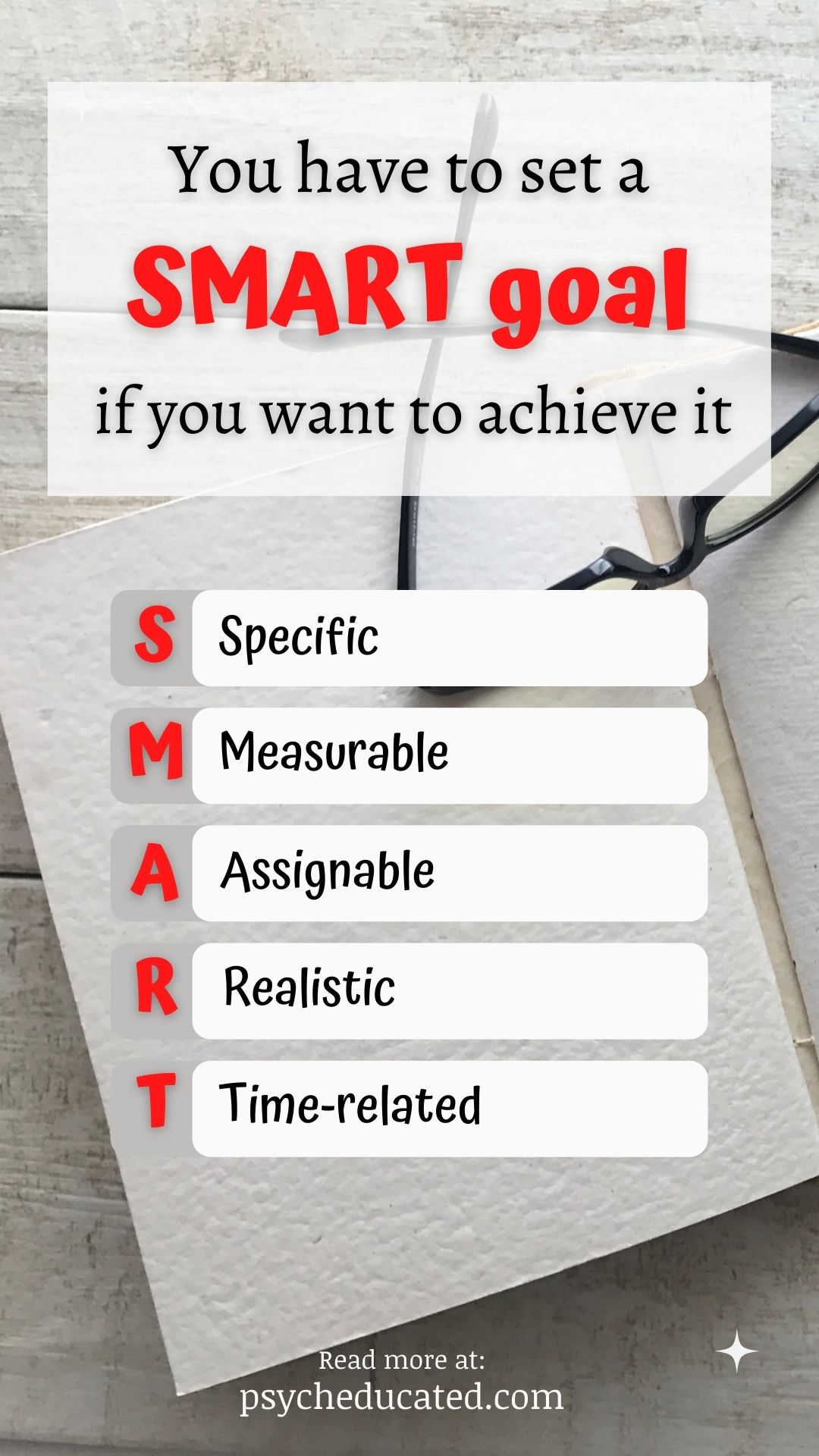Find us on:
How To Overcome Obstacles Stopping You From Achieving Goals

Do you want to know how to achieve your goals and dreams? How to set SMART goals, and what you need to do to get where you want? … Continue reading…
In the previous article, we talked about the reasons that may be stopping you from achieving your goals, like procrastination, self-sabotage, low self-confidence, perfectionism, irrational fears, making excuses, being unrealistic about what you want, focusing too much on the goal itself instead of the process that is going to lead you to it, and having second thoughts once the challenges hit you along the way.
Today we’re going to see how you can actually achieve your goals and dreams and what you can do to overcome those obstacles stopping you from reaching them.
This is how you can achieve your goals and dreams
A goal gives you something to strive for. It drives you forward and serves as a continual reminder of your aspirations and ambitions.
Make sure to check-mark everything that’s coming next if you want to achieve your goals and dreams.
1. First, make sure your goals are SMART
The first thing that you need to do is set the goals that you want to achieve. But you need to make sure that your goals are SMART if you really want to see them realized.
SMART is an acronym that stands for Specific, Measurable, Assignable (people also use Achievable), Realistic, and Time-related.
The SMART acronym was first developed in 1981 by Goerge T. Doran in his article “There’s a S.M.A.R.T. Way to Write Management’s Goals and Objectives.”
(S) Specific
You need to be as precise as possible when setting your goal and make sure to “target a specific area for improvement.” For example, if you want to get that raise or get the position that you want by the end of the year, what exactly do you need to work on in order to be noticed and valued?
To make the goal statement even more specific, you need to define the Who, What, Why, Where, and When.
For example, you can say, “I will work out in the gym from 8 to 9 every Saturday, Tuesday, and Thursday in order to lose X amount of weight by the end of this year.”
If you are very specific about what you want, you will know exactly what you need to do to achieve that goal or dream.
(M) Measurable
You must “quantify or at least suggest an indicator of progress,” something that will be used to evaluate your achievements.
For example, if you say, “I want to have more quality time with my family.” (More) is not really measurable.
What you can say instead is, “I’ll spend 1 hour every day with my kids-that does not include meal-times or homework-doing something fun.”
You need to include in your goal statement an answer to the question “how much or how many?” for you to be able to track and evaluate your progress and correct your plan if necessary.
So, if you find that going to the gym three times a week is too much for you and not realistic given your busy schedule, you can reduce it to twice a week. Alternatively, if you feel, after a while, that you have achieved a small milestone and that you are ready to challenge yourself, even more, you can increase it to four times a week.
(A) Assignable
You need to “specify who will do it.” In other words, who is going to be responsible for delivering the results?
If you want to achieve a goal as a team, you have got to know exactly who will do what and who is going to lead the process.
If it’s just you, you’ve got to work with what you have, and if it’s an entire team that’s working towards that goal, you need to assign responsibilities to the right people.
(R) Realistic
When making your goal statement, you have to “state what results can realistically be achieved, given available resources.” This means that you can’t expect or hope for something to happen if you don’t possess the abilities, the tools, or the time required to achieve it.
If your goal is not realistic, think of a way to make it achievable using the available resources, or give it more resources: maybe give it more time, more manpower, learn a new skill, or improve yourself in a certain area.
However, if none of these works, just change the goal itself; it’s not realistic.
(T) Time-related
The last thing to do is to “specify when the result(s) can be achieved.” In other words, you must assign a deadline to your goals.
This last element can also fall under “Specific” but I think George Duran felt (SMART goal) was more memorable than SMAR. And he’s right to be fair.
So, what you have to do for your goal to be time-related is to answer the When-question as I explained under Specific, and limit the time needed to achieve your goal.

2. Define a pathway to achieve your goals and dreams
The next thing that you can do after setting those goals is to define a very clear plan of what you are going to do in order to achieve them.
Start by capturing all your thoughts and putting them onto paper. When you brain-dump everything that’s on your mind, you’ll be more focused and have clearer thoughts.
The pathway to achieving your goals and dreams is not always a straight line. In fact, it’s usually more like a winding road with many curves and bumps along the way. But that doesn’t mean it’s not worth the journey.
The most important thing is to have a clear idea of what you want to achieve and a plan to get there. What you can do is break your goal down into smaller, more manageable tasks that you can complete on a daily or weekly basis.
Once you have your pathway defined, it’s important to stay motivated and focused. This can be done by setting realistic deadlines, rewarding yourself after completing tasks, and staying positive even when things get tough.
3. Start before you’re ready
Just start working towards that goal. You don’t have to have everything figured out before you start. In fact, you’ll never have everything figured out. You will be learning along the way.
So start before you’re ready. Start when you feel scared, when you’re uncertain and undecided. Because you’ll never be ready, and that’s okay.
This is the best way to overcome procrastination. Because if you stop for too long to think about it and to prepare yourself for it, chances are that you’ll procrastinate taking action.
So the best way is to start creating something before you even think about it. It’s action that leads to more action.
Related: How to stop being lazy and unmotivated
4. Be passionate about your goal
You need to be passionate about that goal. It has to be important to you if you want to achieve it.
Passion is what drives us to continue working towards our goals when things get tough. It’s what allows us to make sacrifices and stay motivated through setbacks.
When you’re passionate about something, you work harder and longer to achieve it. You look for ways to improve and get better. Commitment becomes an easy task.
Well, there are some things that we can naturally find ourselves passionate about. Those we must definitely pursue till the end. But sometimes we must give a little push to our passion meter to make sure that we commit to achieving that goal.
You can become passionate about your goals if you learn everything there is to learn about them and spend more time thinking about all the new possibilities that will come with them.
If you can visualize yourself achieving those goals, this will make them more believable, more tangible, and closer to being reached.
5. Be consistent, disciplined, and committed
Everyone wants to achieve their goal, but just a few are willing to do what it takes to get there.
Discipline, consistency, and commitment are three of the most important traits that make the difference between someone who achieves their goals and someone who doesn’t. These are the traits that you need to have if you want to be successful.
Discipline is what helps you stay on track when things get hard. It’s what allows you to resist temptations and stay focused on your goal.
Consistency is what keeps you moving forward even when you don’t feel like it. It’s what helps you make progress day after day, week after week, and month after month.
Commitment is what makes you stick with your plan and your routine despite any obstacles or challenges that you may face along the way.
I like what Denzel Washington said at the NAACP Image Awards 2017.
Without commitment, you’ll never start, but more importantly, without consistency, you’ll never finish.
Denzel Washington
6. Stop listening to the negative voices
Whether it’s the voice in your head or the voices of people around you, negativity can instantly kill the momentum and crush all your fabulous plans.
The negative voices in your head are often the source of your fears, doubts, low self-confidence, and insecurities. It’s what makes you procrastinate and self-sabotage.
This voice is often irrational. It sometimes begins to dominate your thoughts even before you have started doing anything.
You have to learn to make peace with it because, after all, it’s trying to keep you safe in your comfort zone. But also try to ignore it and keep going if you want to achieve your goals and dreams.
You could also use positive affirmations to replace negative thinking.
As for the negative voices of people around you, especially those that you can’t easily get rid of, maybe a coworker or a family member. Try to detach yourself from their negativity. Empathize (sometimes negative people can’t help it, it’s just how they are) but don’t get drowned out by them.
When it comes to success and achieving goals, being surrounded by the right crowd is very important, so keep those who lift you up closer than the rest.
Related: 50 Of The Most Inspirational Quotes About Achieving Goals
Conclusion
In order to achieve our goals, we must be willing to face and overcome the obstacles in our way.
This may not always be easy, but with a SMART goal in hand, a clear vision, all the passion, discipline, and commitment that you can find, and the right support system, you can achieve anything you set your mind to.
If you enjoyed this article, share it with your friends! And tell me what you think in the comments!
Pin me!






